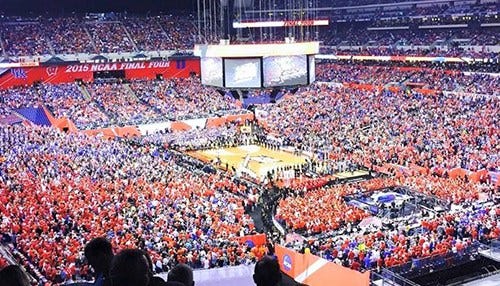NCAA Announces Fan Ban for March Madness Games, Economic Losses
Subscriber Benefit
As a subscriber you can listen to articles at work, in the car, or while you work out. Subscribe NowJust as March Madness begins to ramp-up, the NCAA has decided to drastically cut the number of people who can attend the Division I men’s and women’s basketball tournaments due to the coronavirus. This includes the NCAA Men’s Midwest Regional Tournament in Indianapolis scheduled for March 26 & 28 at Lucas Oil Stadium.
The organization, which is headquartered in Indianapolis, announced Wednesday fans will not be allowed to attend tournament games. Only essential staff and limited family members will be given access to the arenas hosting tournament games across the country.
“While I understand how disappointing this is for all fans of our sports, my decision is based on the current understanding of how COVID-19 is progressing in the United States,” said NCAA President Mark Emmert. “This decision is in the best interest of public health, including that of coaches, administrators, fans and, most importantly, our student-athletes.”
The regional tournament is the last stop before reaching the Final Four and typically draws tens of thousands of basketball fans to a host city. Hotels, restaurants and sports bars would be busy with fans spending millions of dollars.
“When you look at a regional like that, the economic impact is usually estimated to be around $15 to $20 million to the local economy,” said Kyle Anderson, an assistant professor of business economics at the IU Kelley School of Business. “A lot of the out of town fans won’t be coming and it’ll hurt some downtown businesses.”
Anderson, who played college basketball, said during the first games of the NCAA tournament, sports bars typically draw a big crowd as fans watch multiple games on TV.
“It’ll be interesting to see whether that dies down and people just stay home to watch games, out of a little bit of fear (for COVID-19), or whether this just shifts people from actually going to the games to go to the local places to watch anyway.”
Anderson says hotels will be among the biggest tourism-related businesses to feel the loss.
“I don’t know how the hotels will deal with this. They were going to be at full capacity for probably four or five nights (of the regional tournament) and I’m guessing they’re gonna be pretty empty now.”
Meanwhile, the Big Ten conference championship is also being played in Indianapolis. While all fans were still allowed to attend Wednesday night’s opening round of games at Banker’s Life Fieldhouse, that will not be the case for the remainder of the tourney. The Big Ten announced it will follow the NCAA’s decision and limit who’s allowed to attend games,
“The main priority of the Big Ten Conference is to ensure the safety of our student-athletes, coaches, administrators, fans and media as we continue to monitor all relevant information on the COVID-19 virus on a daily basis,” said a statement from the Big Ten.
Chris Gahl, who’s a vice president for VisitIndy, said Indy’s tourism industry is fueled by the nearly 83,000 men and women who depend on tourism for a paycheck. But the organization sees why the NCAA made the tough choice.
“Our priority is the health and safety of each and every one of our hospitality workers and the city’s nearly 30 million annual visitors. As with other major cities across the U.S, we know we aren’t immune from this issue,” said Gahl. “Over the last week, we have proactively called every convention convening here through August, reassuring each of our city’s proactive efforts to keep visitors safe and healthy.”
Anderson said the NCAA was in a tough spot.
“I think they’re wise to exercise caution, and we really don’t want this to spread. They’d hate to see some of their athletes come down with it and be criticized for not having done enough,” said Anderson.
Read the full statement from NCAA President Mark Emmert:
“The NCAA continues to assess the impact of COVID-19 in consultation with public health officials and our COVID-19 advisory panel. Based on their advice and my discussions with the NCAA Board of Governors, I have made the decision to conduct our upcoming championship events, including the Division I men’s and women’s basketball tournaments, with only essential staff and limited family attendance. While I understand how disappointing this is for all fans of our sports, my decision is based on the current understanding of how COVID-19 is progressing in the United States. This decision is in the best interest of public health, including that of coaches, administrators, fans and, most importantly, our student-athletes. We recognize the opportunity to compete in an NCAA national championship is an experience of a lifetime for the students and their families. Today, we will move forward and conduct championships consistent with the current information and will continue to monitor and make adjustments as needed.”
Editor’s Note: Inside Indiana Business continues to monitor for the latest developments on the coronavirus outbreak.
In an interview with Inside INdiana Business, IU Kelley School of Business economics professor Kyle Anderson said economic losses will quickly mount.


